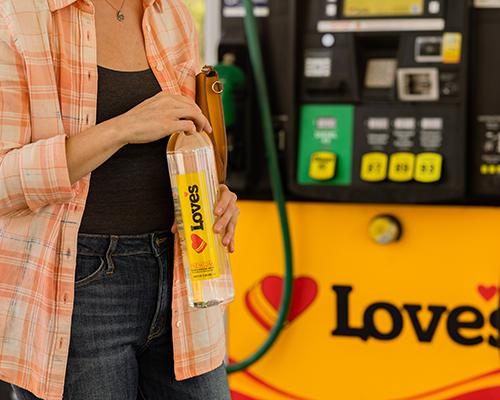The Growth Opportunity Around Private Label
NATIONAL REPORT — Private label programs are still a relatively new endeavor for convenience stores, but the success seen at mass and grocery stores, as well as inside their own locations with select products, has led a number of c-store chains to invest in personnel to drive product development.
As c-stores boost their selection of private label, what product categories should be their focus and how should they develop, merchandise and market these proprietary products to differentiate from retail competitors while giving shoppers something unique?
Chelsey Capps, director of thought leadership at private brand consultancy Daymon, recently spoke with Convenience Store News sister publication Store Brands and shared insight on how convenience store operators can grow their private brand assortments.
SB: What are some current trends in how consumers are shopping retailers in the convenience channel?
Capps: I think it's an extremely fragmented channel by way of both ownership and geographic location. There are many towns in rural America where the local gas station or convenience store is truly their only retail outlet, so that makes c-stores fairly unique by way of having more challenges in the complexities of distribution.
Another element to c-stores is that younger shoppers are, without a doubt, the largest demographic most frequently shopping at c-stores. So, you've got 45 percent of Gen Z telling us that they shop at least monthly compared to just 16 percent of Gen Xers.
The other really interesting thing that transpired more recently is that higher income shoppers are also shopping at c-stores, with data telling us that this group of shoppers has had the largest increase of c-store trips for Q1 of 2023.
SB: Are there any specific shopping behaviors that c-store operators need to be aware of that provide opportunity for new sales?
Capps: There is a very interesting juxtaposition that happens inside a c-store. Personally, I hardly ever drink soda and will not buy it at the grocery store. However, when I walk inside a c-store, all of a sudden I turn into a kid again and I'm in the land of guilty pleasure and making decisions that I wouldn't traditionally make if I was in any other channel of trade. So, that's what makes it unique and fun, because there is this childlike element to c-stores where during a road trip, you stop to buy your favorite candy bar or some ice cream.
Now, is that to say that c-stores don't have tons of opportunity to continue paving the way into more better-for-you options? Absolutely not. It's just to say that there is this shift in behavior the second you're inside of the c-store environment.
SB: What is driving Gen Z to convenience stores? Will this behavior moderate over time as they age?
Capps: Historically, we've seen that younger shoppers have always gravitated toward convenience stores. Today, a lot of younger shoppers are using convenience stores as almost like a quick-service restaurant replacement of sorts with some of these convenience stores having strong programs within prepared food. So, I think what we're seeing is that it is really attractive to these younger shoppers. And to be honest, I think historically it always has been no matter the generation.
But I think what we're seeing is that younger shoppers tend to skew more toward certain categories that these stores as a total channel specialize in. You're hard-pressed to find greater energy drink sales outside of the c-store channel. One of the key indicators for why they are so successful in attracting younger shoppers has to do with their assortment and offering a level of convenience that allows them to get in and get out easily.
SB: What is leading to more traffic from higher income shoppers?
Capps: There has been a shift from pre-pandemic until now and that is a high percentage shift of the workforce that is either working fully at home or hybrid. This provides the higher income shopper [more opportunity] to walk inside a c-store and pick up a snack or beverage.
SB: From a category standpoint, as convenience stores look for growth in private label, are there certain categories that should be their focus?
Capps: I think the ubiquitous categories such as nuts and water are where you start. However, innovation is another really critical play for many retailers, specifically with the regional retailers where they have distribution challenges. So, private label can really offer an opportunity to drive innovation and develop into the white space or fill a gap that is currently not served at their retailer today.
It is also critical as c-stores are developing private brand programs to think beyond the national brand equivalent. They need to strategically lean into private label with a strong program and strategy that is focused on innovation. Having national brand equivalents is not going to drive newness and excitement the same way that innovating will.
SB: How should convenience stores merchandise and market their private label to drive attention to their assortment?
Capps: It's critical for c-stores to really know their customers. For example, a candy set that works in one part of the country may need to be set differently in another part of the country. Understanding consumer differences from a regional basis is important to think about when developing a merchandising plan and product strategy mix.
On the product side, I would suggest leaning into flavor innovation. At Daymon, we have seen some best-in-class c-stores with strong private brand programs that are really innovating with flavors. Developing head-turning, bold flavors for younger shoppers will drive newness and excitement.
SB: Is there an opportunity for convenience stores to use private label programs to expand into categories they currently do not offer?
Capps: C-stores have gotten a lot better at identifying opportunities for growth. For example, the health and wellness segment and offering better-for-your options are just a few that provide new opportunities to connect with consumers.


